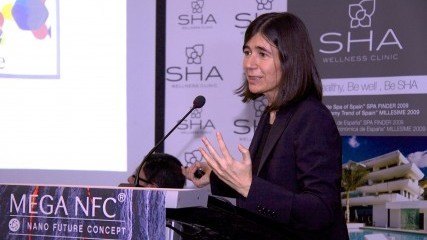Subscribe to our newsletter
Receive news and benefits on health and wellness.

SHA Magazine SHA Magazine
Last Friday March 22nd we hosted at SHA a seminar about anti-aging entitled: “The keys to a long healthy life” in which renowned scientists like Dr. Maria Blasco Marhuenda, Dr. Gloria Sabater and Dr. Vicente Mera discussed about the latest advances in telomere and telomerase research and its application in areas such as rejuvenation, anti-aging for a life extension and cancer prevention.
What is a telomere? Telomeres are the ends of chromosomes, DNA coding regions whose length determines the biological age of our cells. The latest scientific theories on rejuvenation and anti-aging determine our telomeres are like our hourglass that marks how long our cells can live. Furthermore, our biological age can be measured by the telomere test, an analysis that measures our telomere length.
What is telomerase? Telomerase is an enzyme that protects and lengthens telomeres. However, many cancer cells reactivate telomerase activity and favor the development of cancer, so the latest cancer research using Telomere studies are aimed to prevent this proliferation of malignant cells, contributing to cancer prevention while promoting natural rejuvenation and life extension. Now the main question is: If we activate telomerase in a controlled manner, could we can get a life extension without causing more cancer?
Anticancer studies using Telomere and Telomerase Research are so important that achieved the Nobel Prize in Medicine in 2009 from the hand of the scientists Elizabeth Blackburn, Carol Greider and Jack Szostak.
Dr. Maria Blasco, Director of the Spanish National Center for Cancer Research, is the most prominent scientific in Spain in the study of telomeres and telomerase. In her speech, she explained her anticancer research conducted on mice to fight cancer and to slow down the aging process. In addition, Dr. Blasco certified that there are some food supplements such as TA-65 that activate telomerase and contribute to natural rejuvenation and life extension without causing cancer.
Dr. Gloria Sabater, geneticist oriented to life extension, highlighted the importance of studying the genes of people through detailed genetic analysis which show the probability to suffer certain diseases and help to prevent them in order to ensure a longer life expectancy.
In addition, Dr. Vicente Mera showed in his speech that factors such as stress or poor diet also favor telomere shortening. So, keeping a healthy lifestyle is essential if you want to stop premature aging and facilitate the prevention of cancer, amongst many other diseases. According to Dr. Mera, humans are able to live for 120 to 130 years on a full active Telomeres and by avoiding a bad livestyle. In fact, the key to healthy aging can be summarized as: healthy diet, daily exercise and relaxation.
If you want to know the main conclusions of these conferences you can follow the comments made on Twitter using the hashtag #SHAntiaging.
Related posts:
Receive news and benefits on health and wellness.
